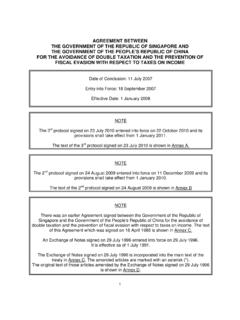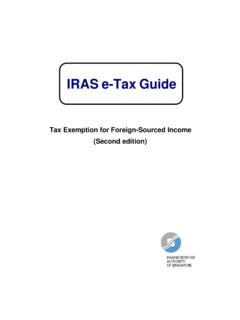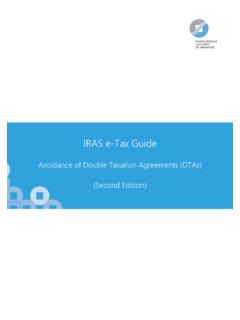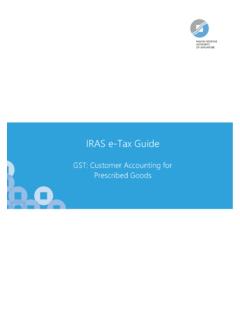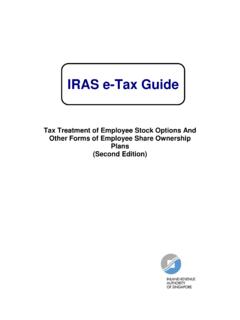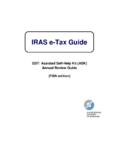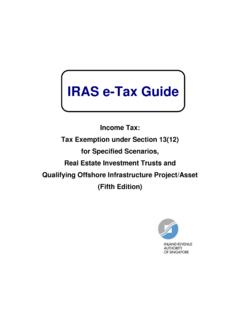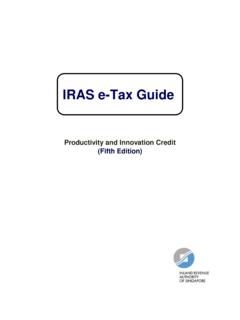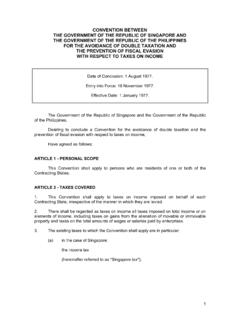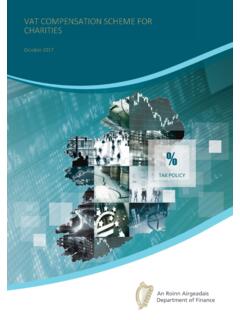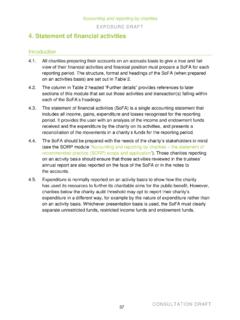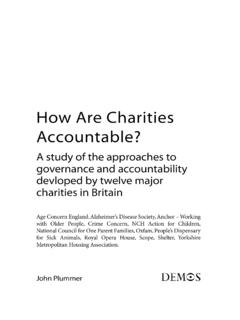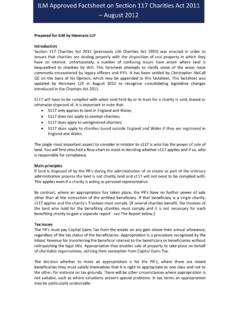Transcription of IRAS e-Tax Guide
1 GST: Guide For charities and Non-profit Organisations (Third Edition) iras e-Tax Guide Published by Inland Revenue Authority of Singapore Published on 12 Jun 2015 First edition on 31 Dec 2013 Second edition on 26 Mar 2015 Disclaimers: iras shall not be responsible or held accountable in any way for any damage, loss or expense whatsoever, arising directly or indirectly from any inaccuracy or incompleteness in the Contents of this e-Tax Guide , or errors or omissions in the transmission of the Contents. iras shall not be responsible or held accountable in any way for any decision made or action taken by you or any third party in reliance upon the Contents in this e-Tax Guide . This information aims to provide a better general understanding of taxpayers tax obligations and is not intended to comprehensively address all possible tax issues that may arise.
2 While every effort has been made to ensure that this information is consistent with existing law and practice, should there be any changes, iras reserves the right to vary our position accordingly. Inland Revenue Authority of Singapore All rights reserved. No part of this publication may be reproduced or transmitted in any form or by any means, including photocopying and recording without the written permission of the copyright holder, application for which should be addressed to the publisher. Such written permission must also be obtained before any part of this publication is stored in a retrieval system of any nature. TABLE OF CONTENTS 1 Aim .. 1 2 At a glance .. 1 3 Background .. 1 4 GST registration .. 2 5 Types of supplies .. 2 6 Grants, donations, sponsorships and fund raising .. 3 7 Rules for claiming input 6 8 Input tax apportionment for organisations having business and non-business activities .. 7 9 Property held by trustee.
3 11 10 Contact information .. 12 11 Updates and amendments .. 12 Appendix 1 .. 13 Appendix 2 .. 14 GST: Guide For charities And Non-Profit Organisations 1 1 Aim This e-Tax Guide1 explains: (a) The application of GST on the activities carried out by charities and non-profit organisations; and (b) The distinction between business and non-business activities, the types of transactions for which GST is chargeable and the rules for claiming GST incurred on expenses. 2 At a glance A GST-registered charity or non-profit organisation (taxable person) may undertake various activities, some of which are business and some may be non-business in nature. A taxable person is required to charge and account for GST (output tax) on his taxable supplies. He is entitled to claim the GST incurred on his expenses (input tax) for making taxable supplies in the course his business. He is however unable to claim the GST incurred in respect of his non-business activities.
4 3 Background charities and non-profit organisations typically engage in a variety of activities. You need to know which activities are business activities that make taxable supplies and which are not. The non-business element usually exists in activities which are in the public domain and are philanthropic, religious, political or patriotic in nature. This distinction is necessary because if the annual value of your taxable supplies exceeds or is expected to exceed S$1 million, you are required to register for GST. You need to account for GST (output tax) on your taxable supplies and are able to claim the GST incurred (input tax) to make your taxable supplies. You may have activities for which you charge nominal or subsidised fees. They are charged at nominal or subsidised rates because of non-business reasons. Such activities have both business and non-business elements. The funding for the non-business elements often comes from outright donations and grants.
5 For example, if you charge a nominal fee for a certain public event you are organising for a philanthropic purpose. The part of the fee charged has a business element, while the subsidised part of the fees not borne by the customers is non-business in nature. Free activities that you carry out for reasons other than a commercial one are non-business activities. They do not attract GST because no supply is 1 This e-Tax Guide replaces the iras e-Tax Guide GST: Guide For charities and Non-profit Organisations published on 26 Mar 2015. GST: Guide For charities And Non-Profit Organisations 2 made. Examples include the provision of free medical services and free talks that benefit the public or a segment of the public and fund raising activities to solicit outright donations from the public for non-business causes. 4 GST registration You are required to register for GST if the annual value of your taxable supplies exceeds or is expected to exceed S$1 million, even though you are involved substantially in non-business activities and the taxable activities may be incidental to your core objects.
6 If you carry out your activities under different arms within the same organisation, you should combine the taxable supplies from all these activities to arrive at the annual value of your taxable supplies. For example, you are registered as a religious organisation (say under the Societies Act) and hold religious classes for which attendees are charged a fee. At the same time, you operate a childcare facility and nursing home at different locations. You should take into account the value of all your taxable supplies, fees charged for the religious classes, the childcare facility, the nursing home services, etc to determine if you are required to register for GST. To determine when you need to register for GST and how to apply for GST registration, please refer to the e-Tax Guide Do I Need to Register? published on iras website at 5 Types of supplies As a GST-registered charity or non-profit organisation, other than taxable supplies, you may also make exempt supplies.
7 Generally, the sale of goods (including your fixed assets) and provision of services for a consideration are taxable supplies, which may be standard-rated supplies ( subject to GST at 7%) or zero-rated supplies2 ( subject to GST at 0%). The following are examples of consideration received for the provision of taxable supplies: School fees, training/course fees; Programme fees ( for counselling programme); Kidney dialysis fees; Day-care facility fees; Rental income from the letting of non-residential properties; Proceeds from the sale of donated goods; Proceeds from the sale of non-residential properties and fixed assets. 2 Taxable supplies can be zero-rated if they are sale of goods exported by you or provision of international services. Please refer to iras website ( ) for more details. GST: Guide For charities And Non-Profit Organisations 3 The following are examples of consideration received for the provision of exempt supplies3: Interest received from bank deposits; Proceeds from sales of shares, bonds and unit trusts; Rental income from the letting of residential properties4; Proceeds from the sale of residential properties.
8 6 Grants, donations, sponsorships and fund raising As a charity or a non-profit organisation, you may receive funding in the form of grants, donations and sponsorships. You may also organise fund raising events to raise funds. To ascertain if you need to account for GST on such monies received, the key determinant is whether you are providing any benefits to the giver in return for the monies received. If you are providing some benefits of tangible value to the giver, the monies received by you form a consideration for the supplies you made (benefits given) to the giver. You need to account for output tax on the monies received, at the tax fraction of the prevailing tax rate ( 7/107 x monies received). If you are not providing any benefits to the giver, the monies received do not attract GST. Grants Grants may be in the form of outright payments given freely with no benefits provided in return by you (the recipient) to the grantor.
9 Such grants fall outside the scope of GST as you are not providing any goods or services to the grantor in return for the grant. Such grants may be received from government agencies, charitable or non-profit organisations, the business community, etc. If you receive grants in return for providing benefits directly to the grantor in the form of goods or services, you have to account GST (output tax) at 7/107 of the grant amount. For example, you receive a grant to design a special wheelchair and allow the grantor to patent that design. In this case, the grant is a consideration received by you for the making of a taxable supply to the grantor. Donations Pure outright cash donations received fall outside the scope of GST. Cash donations or voluntary contributions of money from the public where the donor receives negligible or no tangible benefits ( a flag or similar emblem) do not attract GST. 3 Exempt supplies are provision of financial services, sale and lease of residential land/property and supplies of investment previous metals.
10 Please refer to iras website for more details. 4 The portion of income relating to rental of furniture is still taxable. GST: Guide For charities And Non-Profit Organisations 4 Donations in-kind, for example gift vouchers or gift of goods, received by you where the giver does not receive anything in return from you are outright donations that similarly do not attract GST. If the donors are entitled to some form of benefits ( chances to win in lucky draws when making contributions towards the charity event), the sums received are subject to GST. The ticket sales of lotteries and donation/lucky draws attract GST as the ticket holder receives a chance of winning in return for the purchase of ticket. You have to account for GST at 7/107 on the total gross takings received less cash payouts to winners5. If the payouts are not in cash but in the form of goods or services, output tax has to be accounted at 7/107 on the total gross takings received ( the gross takings are considered to be inclusive of GST).
